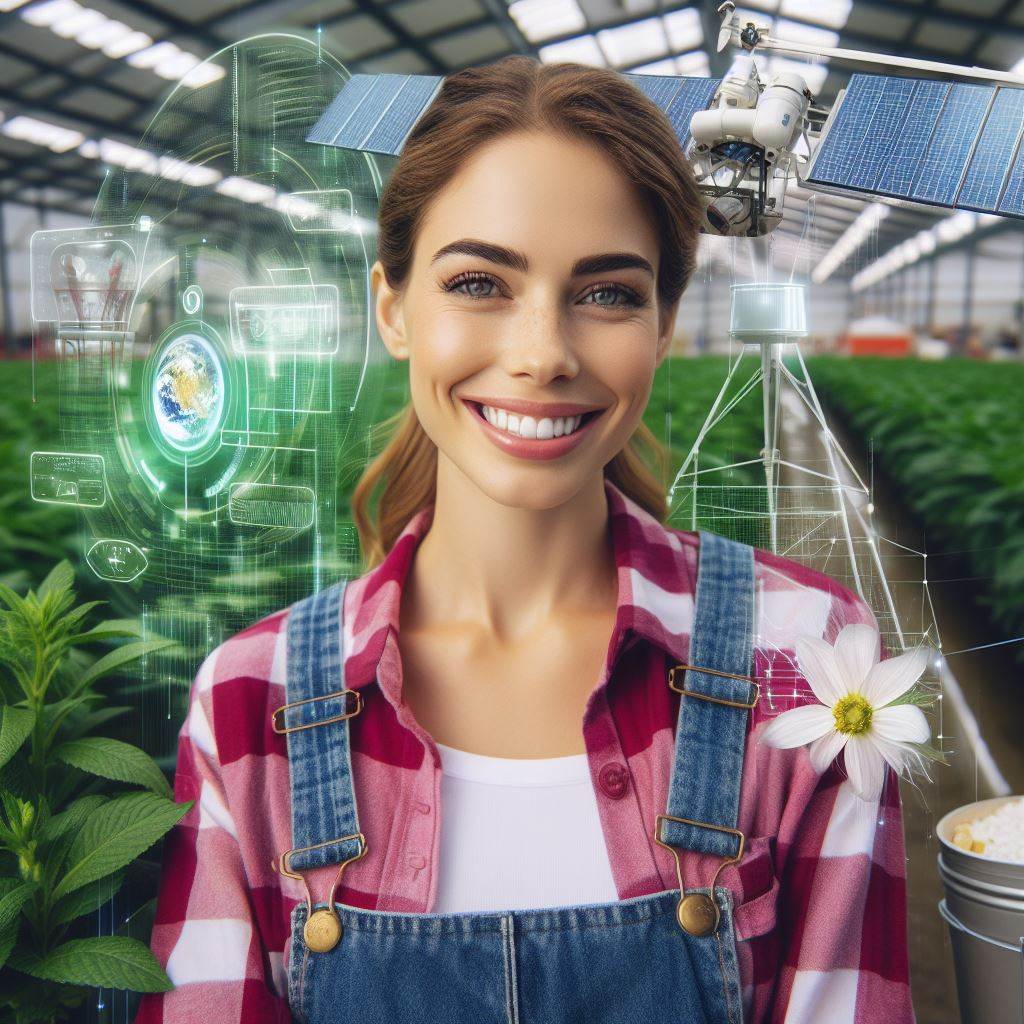Introduction
Brief overview of the topic
Advancements in technology have transformed and improved numerous industries, and app-controlled farming is no exception.
The introduction of app-controlled farming has revolutionized the agricultural sector, allowing farmers to optimize their operations and increase yields.
Through the use of specially designed mobile applications, farmers can remotely control and monitor various aspects of their farming processes.
These apps provide real-time data on soil conditions, weather forecasts, crop growth, and pest management, among other factors, enabling farmers to make timely and informed decisions.
Importance of app-controlled farming in modern agriculture
One of the key benefits of app-controlled farming is the increased efficiency it offers.
Farmers can automate tasks such as irrigation and fertilization, ensuring optimal resource utilization.
Additionally, the ability to remotely monitor crops and receive alerts for potential issues enables farmers to address problems swiftly, preventing crop loss and minimizing damage.
Furthermore, app-controlled farming promotes sustainability by reducing the excessive use of resources.
By precisely managing water usage and fertilizer application, farmers can minimize waste and environmental impact.
This not only benefits the ecosystem but also reduces costs for the farmers, making their operations more economically viable.
Basically, app-controlled farming is a game-changer for the agricultural industry.
It enhances efficiency, productivity, and sustainability, allowing farmers to maximize their yields while minimizing resources and costs.
This technological advancement paves the way for a new era in farming, where increased automation and data-driven decision-making lead to a more prosperous and sustainable future.
Benefits of App-Controlled Farming
Increased automation and precision
App-controlled farming provides numerous benefits that contribute to the advancement of agriculture.
By utilizing mobile applications and various technological devices, farmers can enhance their operations in terms of automation, precision, resource management, crop yield, and quality.
One significant benefit of app-controlled farming is increased automation and precision.
Through the use of apps, farmers can remotely monitor and control various farming operations.
This ensures that tasks are carried out efficiently, reducing the need for physical presence at all times.
Farmers can remotely access important data, such as temperature, humidity, and soil moisture, allowing them to make informed decisions in real-time.
The utilization of sensors and smart devices further enhances data collection, enabling farmers to gather accurate information for analysis and decision-making.
Enhanced resource management
Enhanced resource management is another advantage of app-controlled farming.
By optimizing water, fertilizer, and pesticide usage, farmers can reduce waste and improve sustainability.
Apps assist in monitoring resource levels and consumption, providing farmers with valuable insights on how to efficiently utilize these resources.
This not only helps conserve valuable resources but also minimizes costs for farmers, making their operations more financially viable.
Improved crop yield and quality
App-controlled farming also leads to improved crop yield and quality.
Accurate and timely decision-making based on the data generated by these apps helps farmers optimize their cultivation practices.
By closely monitoring crop growth and environmental conditions, farmers can make informed decisions regarding irrigation, nutrient application, and other necessary interventions.
Additionally, the early detection and mitigation of pests, diseases, and other issues through app monitoring play a crucial role in ensuring healthy and high-quality crops.
Minimization of human error
Furthermore, app-controlled farming minimizes human error and maximizes the utilization of human expertise.
By automating manual labor-intensive tasks, the risk of potential mistakes is reduced.
This allows farmers to focus on higher-level tasks that require their expertise.
Additionally, the data collected by apps can be analyzed by agricultural experts, enabling them to develop effective strategies for crop management, disease prevention, and overall farm optimization.
In short, app-controlled farming brings immense benefits to the agriculture industry.
Increased automation and precision, enhanced resource management, improved crop yield and quality, and minimization of human error are just a few advantages that these technologies offer.
As technology continues to advance, app-controlled farming will undoubtedly play a significant role in shaping the future of agriculture.
Farmers who embrace these innovations can expect increased productivity, sustainability, and profitability in their farming operations.
Read: Small Farm, Big Debt: A Financial Saga
App-Controlled Farming Technologies
In today’s rapidly advancing technological landscape, farming has embraced the digital revolution.
App-controlled farming technologies are revolutionizing traditional farming methods, ushering in a new era of efficiency, precision, and sustainability.
This blog section explores the various technologies and popular farming apps that are transforming the agricultural industry.
Overview of available technologies
1. IoT devices and sensors
IoT (Internet of Things) devices and sensors have become indispensable tools in app-controlled farming.
These devices collect real-time data on environmental factors, such as temperature, humidity, and soil moisture levels.
Farmers can remotely monitor these variables through intuitive, user-friendly apps.
2. Drones and aerial imaging
Drones equipped with high-resolution cameras are revolutionizing crop monitoring and analysis.
They provide farmers with bird’s-eye-view images of their fields, enabling them to identify problem areas, assess crop health, and detect diseases or pests early on.
Aerial imaging technology is a game-changer in precision agriculture.
Transform Your Agribusiness
Unlock your farm's potential with expert advice tailored to your needs. Get actionable steps that drive real results.
Get Started3. Robotics and autonomous machinery
Robots and autonomous machinery are making manual labor on farms more efficient and less labor-intensive.
From autonomous tractors to robotic harvesters, these machines can perform tasks with precision, accuracy, and speed.
App-controlled functionalities allow farmers to remotely operate and monitor these machines, optimizing their performance.
Examples of popular farming apps
1. App functionalities for monitoring weather, soil conditions, and crop growth
Farming apps offer real-time monitoring of weather conditions, helping farmers make informed decisions regarding irrigation, planting, and harvest timing.
Additionally, these apps provide data on soil conditions, enabling farmers to optimize fertilization schedules and adjust crop-specific needs.
Crop growth monitoring ensures timely interventions for optimal yields.
2. Remote management tools for irrigation, fertilization, and pest control
App-controlled farming apps offer remote management of irrigation systems, ensuring optimum water usage and reducing water wastage.
Farmers can control irrigation schedules based on moisture levels, reducing water stress on crops.
Similarly, these apps enable remote fertilization management, taking into account soil conditions and crop requirements.
Pest control can also be monitored and managed through these apps.
3. Data analysis and prediction models for optimized farming practices
Farming apps are equipped with sophisticated data analysis and prediction models.
By analyzing historical and real-time data on weather, soil conditions, and crop performance, these apps provide actionable insights for optimized farming practices.
Farmers can make data-driven decisions regarding crop rotation, pest control, and resource allocation, ultimately increasing productivity and profitability.
In essence, farming controlled by an application technologies have transformed traditional farming practices by harnessing the power of IoT, drones, robotics, and data analysis.
These technologies provide farmers with real-time data, remote management capabilities, and predictive models for making informed decisions.
Embracing app-controlled farming is not just a step towards efficiency and profitability but also a sustainable approach to agriculture in the modern era.
Read: Organic Trials: One Farmer’s Shift Story

Learn More: Her Soil, Her Story: Female Farmers’ Journeys
Challenges and Limitations
App-controlled farming, with its innovative approach, brings several advantages to modern agriculture.
However, it also introduces challenges and limitations that need to be addressed for widespread adoption.
Initial investment costs
One significant challenge is the upfront expenses associated with implementing farming controlled by an application technologies.
Farmers must evaluate the affordability and accessibility of these advanced tools.
Can they afford the necessary equipment and infrastructure to embrace this new era?
Additionally, it’s crucial to understand the potential long-term cost savings and return on investment that farming controlled by an application can bring.
Connectivity and data management issues
Another challenge is the reliance on stable internet connectivity and robust network infrastructure.
App-controlled farming heavily depends on the Internet of Things (IoT) and data transmission.
Without a consistent and reliable internet connection, farmers may experience disruptions in their farming operations.
Moreover, privacy and security concerns arise concerning the transmission and storage of sensitive data.
Protecting this information from cyber threats becomes a top priority in farming controlled by an application.
Technical skills and adaptation
The successful utilization of farm management apps requires farmers to develop specific technical skills.
Proper training becomes crucial to ensure farmers can effectively utilize the features and capabilities of these applications.
Overcoming the resistance and skepticism towards technology adoption also poses a significant challenge.
Farmers must be open to adapting their traditional methods and embracing the potential benefits that app-controlled farming can offer.
Despite these challenges and limitations, solutions and strategies can help overcome them.
Collaboration between technology providers and farmers is essential to address affordability concerns.
Creating subsidies or financial assistance programs can assist farmers in acquiring farming controlled by an application technologies.
Moreover, emphasizing the long-term cost savings and return on investment can encourage farmers to view these tools as worthwhile investments.
Connectivity challenges can be mitigated by expanding and improving network infrastructure in agricultural areas.
Government initiatives and partnerships with telecommunication companies can help ensure reliable internet connectivity across rural regions.
Additionally, implementing robust security measures, such as encryption and data backup, can alleviate privacy and security concerns regarding sensitive farm data.
To tackle technical skills and adaptation challenges, comprehensive training programs should be developed to assist farmers in embracing and utilizing farm management apps effectively.
Providing hands-on training and continuous support can boost confidence and competence in using these technologies.
Additionally, sharing success stories and testimonials from early adopters can help alleviate resistance and skepticism within the farming community.
In review, while farming controlled by an application brings advancement and efficiency to agriculture, it is essential to address the challenges and limitations associated with its implementation.
Understanding affordability, connectivity, and skills adaptation issues allows for strategic planning and necessary measures.
With collaborative efforts from stakeholders and a focus on training and support, app-controlled farming can overcome these obstacles and pave the way for a new era in agriculture.
Read: Climate Change: An Alaskan Farmer’s Fight
Future Implications
In addition to the immediate benefits of increased efficiency, reduced costs, and enhanced crop yields, the future implications of app-controlled farming are vast.
These implications extend to various domains, including global food production, integration with emerging technologies, and the role of app developers and collaboration with farmers.
Increased global food production
App-controlled farming has the potential to address the impending challenge of feeding a growing population.
By leveraging technology, farmers can enhance their productivity and output.
Mobile apps can provide real-time monitoring of crops, enabling better decision-making and optimized resource allocation.
Consequently, app-controlled farming can significantly contribute to increasing global food production.
Integration with emerging technologies
The integration of app-controlled farming with emerging technologies holds tremendous promise for the agriculture industry.
Artificial intelligence and machine learning algorithms can analyze vast amounts of data gathered from various sensors in the field.
This data-driven approach can facilitate predictive analysis, allowing farmers to make informed decisions regarding irrigation, fertilization, and crop protection.
Furthermore, blockchain technology can provide transparency and traceability in the food supply chain, ensuring trust and reducing fraud.
Role of app developers and collaboration with farmers
App developers play a pivotal role in shaping the future of app-controlled farming.
User-centered design principles should be at the forefront of their development process, ensuring that the apps are intuitive, accessible, and cater to the specific needs of farmers.
Furthermore, continuous improvement and updates based on user feedback are crucial for the long-term success of these apps.
Collaboration between app developers and farmers is essential for driving innovation.
By actively involving farmers in the design and development process, app developers can gain valuable insights into the practical challenges faced by farmers on the ground.
This collaborative approach can lead to the creation of solutions that truly address farmers’ needs and contribute to sustainable agriculture.
In general, the future implications of app-controlled farming are significant.
Aside from increasing global food production to meet the needs of a growing population, app-controlled farming can integrate with emerging technologies such as artificial intelligence and blockchain.
Moreover, the collaboration between app developers and farmers is crucial for developing user-friendly solutions and driving innovation in the agricultural industry.
By embracing these future implications, we can usher in a new era of efficient, sustainable, and technology-driven farming practices.
Read: Pest Plight: Stories from the Field
Conclusion
Recap of the benefits and potentials of app-controlled farming.
App-controlled farming offers numerous advantages, including increased efficiency, improved accuracy, and reduced labor costs.
It enables farmers to monitor and control their operations remotely, resulting in enhanced productivity and higher yields.
Showcase Your Farming Business
Publish your professional farming services profile on our blog for a one-time fee of $200 and reach a dedicated audience of farmers and agribusiness owners.
Publish Your ProfileEncouragement for farmers to embrace this new era of agricultural technology.
To stay competitive in the evolving agricultural landscape, farmers must embrace app-controlled farming.
By leveraging the power of technology, they can streamline their processes, make informed decisions, and stay ahead in the market.
Call to action to explore and adopt app-controlled farming practices for a more efficient and sustainable future.
It is imperative for farmers to explore the possibilities of app-controlled farming and integrate it into their agricultural practices.
By doing so, they can contribute to a more efficient and sustainable future, ensuring food security and meeting the demands of a growing population.
App-controlled farming is revolutionizing the agricultural industry, providing farmers with unprecedented control and insight into their operations.
The benefits and potentials of this technology are vast, ranging from increased productivity to sustainable farming practices.
Therefore, it is crucial for farmers to embrace this new era of agricultural technology.
By adopting app-controlled farming practices, they can optimize their operations, improve resource utilization, and ultimately, maximize their yields and profits.
To seize the potential of app-controlled farming, farmers need to take action.
They should explore the available apps, seek training if required, and adapt their farming practices accordingly.
By doing so, they can unlock the full potential of this revolutionary technology and ensure a prosperous future for themselves and the agricultural sector as a whole.




